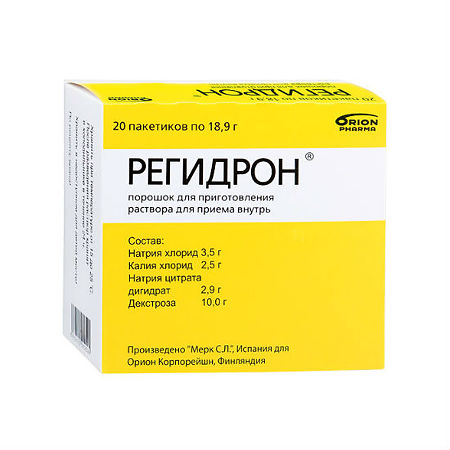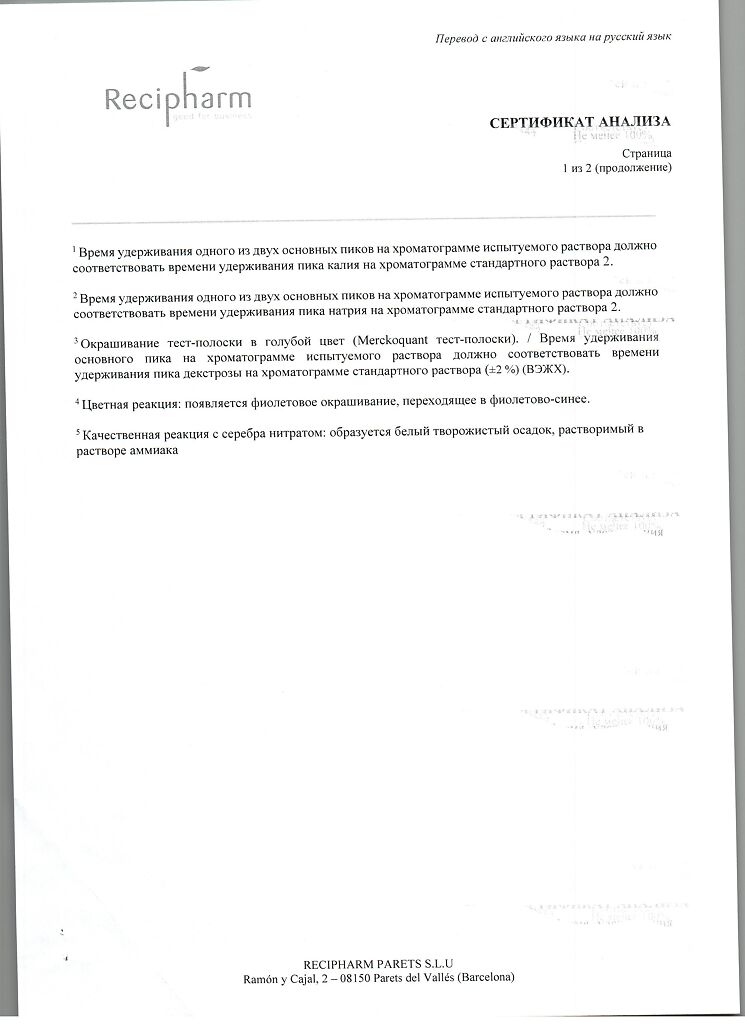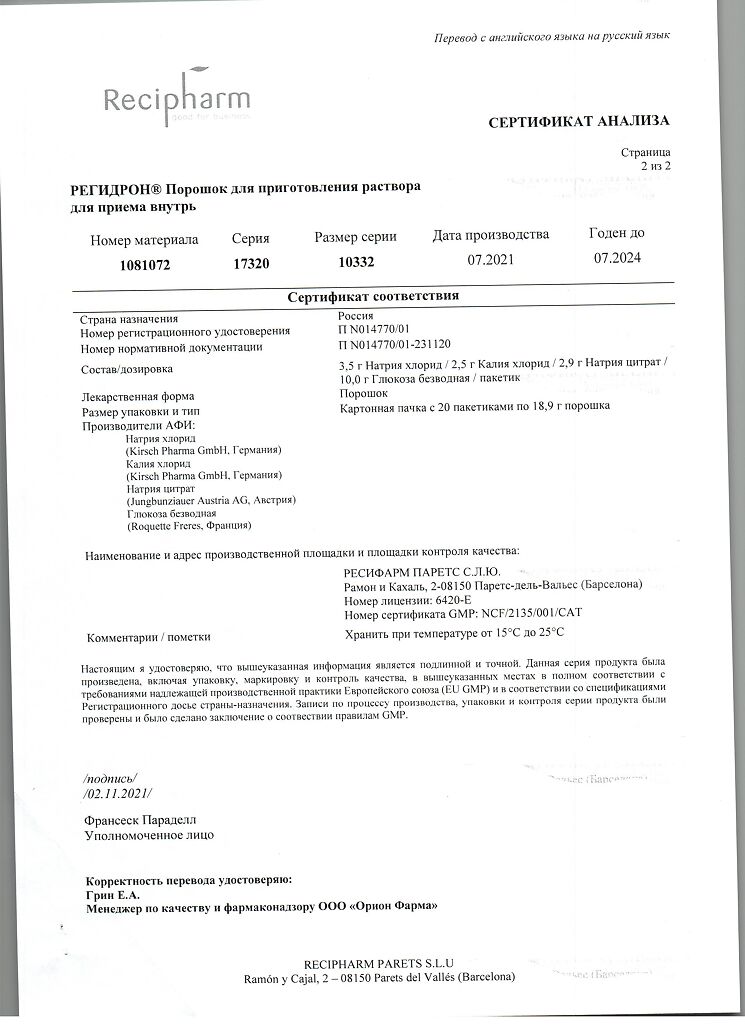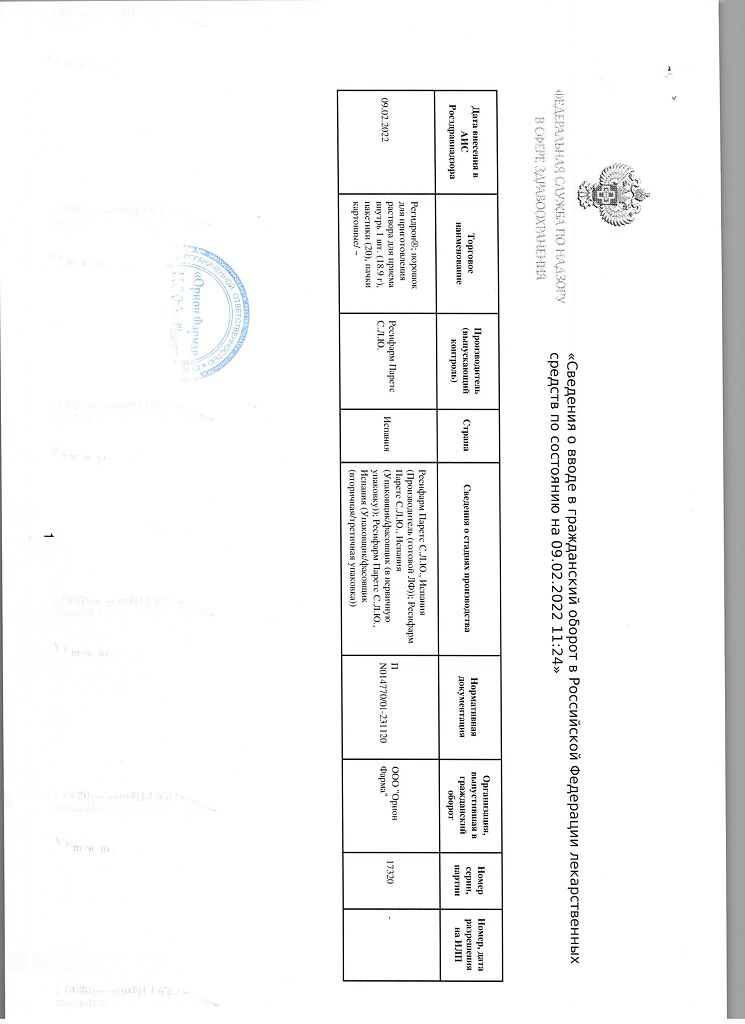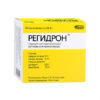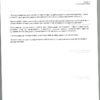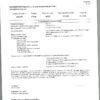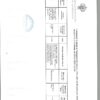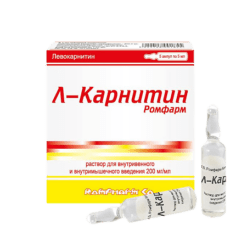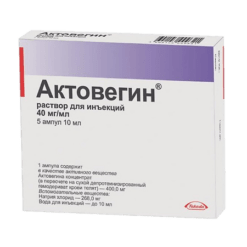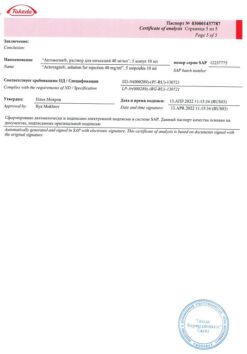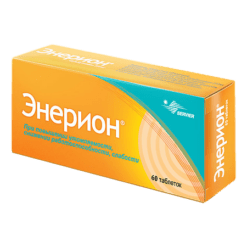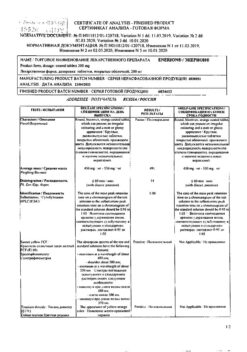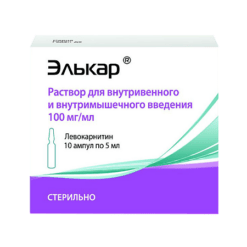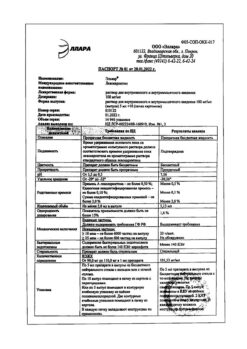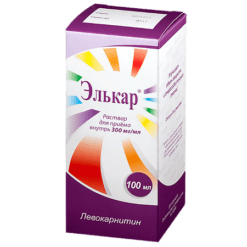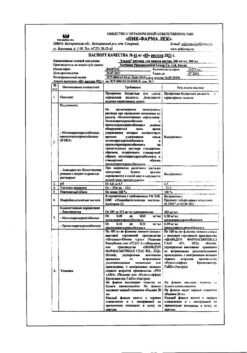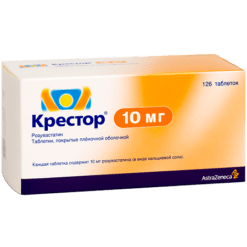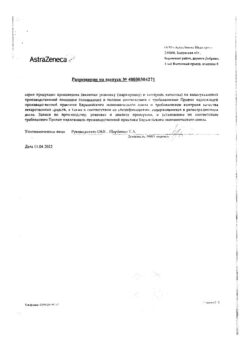No products in the cart.
Regidron, 20 pcs.
€1.00
Out of stock
(E-mail when Stock is available)
Description
Pharmacotherapeutic group
Rehydration drug for oral administration.
ATC code
A07CA
Pharmacological properties
Pharmacodynamics
Medicinal product Regidron® is used for correction of electrolytes and fluid loss during diarrhea. Dextrose promotes electrolyte absorption, which contributes to the correction of metabolic acidosis. Osmolarity of the solution is 282 mosm/l, pH – 8.2.
Pharmacokinetics
Pharmacokinetic properties of water, electrolytes and dextrose contained in the drug are similar to those in the human body.
Indications
Indications
Oral rehydration (replenishment of fluid in the body) and prevention of dehydration in acute diarrhea accompanied by mild to moderate dehydration. The drug replenishes water and salt reserves.
Pharmacological effect
Pharmacological effect
Pharmacotherapeutic group
Oral rehydrating agent.
ATX code
A07CA
Pharmacological properties
Pharmacodynamics
The drug Regidron® is used to correct the loss of electrolytes and fluid due to diarrhea. Dextrose promotes the absorption of electrolytes, which helps correct metabolic acidosis. The osmolarity of the solution is 282 mOsm/l, pH – 8.2.
Pharmacokinetics
The pharmacokinetic properties of water, electrolytes and dextrose included in the drug are similar to those contained in the human body.
Special instructions
Special instructions
In children, other solutions with lower sodium content and osmolarity should be used.
Considering the composition of the drug, caution should be exercised in patients with diabetes mellitus, impaired liver or kidney function, as well as in patients on a diet low in salt (sodium and/or potassium).
In patients with diabetes mellitus, renal failure, and some other chronic diseases, diarrhea can cause significant disruption of fluid or glucose balance. Therefore, treatment of diarrhea in such patients may require laboratory monitoring and hospitalization.
If the patient’s need for additional administration of electrolytes is not confirmed by laboratory tests, the recommended doses of the drug should not be exceeded.
Severe dehydration (weight loss >10%, cessation of urine output) should be treated with intravenous rehydration drugs, after which the use of Regidron® solution can be started.
If intravenous administration of drugs is necessary or in case of severe dehydration or severe vomiting, or if urine output decreases or stops, Regidron® should be used with caution.
If vomiting, wait 10 minutes after the vomiting attack ends and let the solution be drunk slowly, in small sips.
The patient should consult a doctor if the following situations occur while using Regidron®:
• slow speech, irritability, rapid fatigue, drowsiness, stupor occur;
• temperature rises above 39C;
• bloody stools;
• continuous vomiting;
• diarrhea lasts more than 2 days;
• severe abdominal pain.
The use of Regidron® solution to replenish the loss of salts during diarrhea that develops with cholera and a number of other severe intestinal infections may not be enough.
Persons with renal failure or on a diet low in potassium should be aware that the drug contains potassium.
Impact on the ability to drive vehicles and operate machinery
Does not affect the ability to drive vehicles or engage in other potentially hazardous activities that require increased concentration and speed of psychomotor reactions.
Active ingredient
Active ingredient
Dextrose, Potassium chloride, Sodium chloride, Sodium citrate
Composition
Composition
The drug is a glucose-electrolyte mixture, which contains (per 1 sachet): sodium chloride – 3.5 g, potassium chloride – 2.5 g, sodium citrate dihydrate – 2.9 g, dextrose – 10.0 g. The solution obtained by dissolving 1 sachet in 1 liter of water contains the following concentrations of active ingredients:
Sodium chloride 59.9 mmol
Potassium chloride 33.5 mmol
Sodium citrate dihydrate 9.9 mmol
Dextrose 55.5 mmol
Na+ 89.6 mmol
K+ 33.5 mmol
Cl- 93.4 mmol
Citrate 9.9 mmol
Pregnancy
Pregnancy
In recommended doses, Regidron® can be used during pregnancy and lactation.
Contraindications
Contraindications
Hypersensitivity to the components of the drug. Severe dehydration.
Coma (unconscious state). Intestinal obstruction.
Severe vomiting.
Diarrhea due to cholera. Glucose-galactose malabsorption.
Side Effects
Side Effects
Patients with normal kidney function are at low risk of developing hypernatremia (high sodium levels in the blood) or excess water intake. If taken too quickly, vomiting may occur.
Interaction
Interaction
Not studied. The drug solution has a slightly alkaline reaction, so it can affect medications, the absorption of which depends on the pH of the intestinal contents. Diarrhea itself can alter the absorption of many drugs that are absorbed in the small or large intestine, or drugs that are metabolized through the enterohepatic circulation.
Overdose
Overdose
When a large volume or highly concentrated Regidron® solution is administered (if the rules for preparing the solution are violated), hypernatremia (increased sodium content in the blood) may occur. Symptoms of hypernatremia include weakness, neuromuscular agitation, drowsiness, confusion, coma, and sometimes even respiratory arrest. In patients with reduced renal function, hyperkalemia (increased potassium levels in the blood) may occur, manifested by cardiac arrhythmias and weakness.
If symptoms of overdose occur, you should consult a doctor. Correction of water and electrolyte balance should be carried out based on laboratory data.
Storage conditions
Storage conditions
At temperatures from 15 to 25C.
After dilution, the solution is stored in the refrigerator for 24 hours. Keep out of the reach of children!
Shelf life
Shelf life
3 years.
Do not use the drug after the expiration date indicated on the package.
Manufacturer
Manufacturer
Recipharm Parets S.L., Spain
Additional information
| Shelf life | 3 years. Do not use the drug after the expiration date stated on the package. |
|---|---|
| Conditions of storage | At 15 to 25C. After dilution, keep the solution in the refrigerator for 24 hours. Keep out of reach of children! |
| Manufacturer | Recipharm Parets S.L., Spain |
| Medication form | Powder for preparation of solution for oral administration |
| Brand | Recipharm Parets S.L. |
Related products
Buy Regidron, 20 pcs. with delivery to USA, UK, Europe and over 120 other countries.

